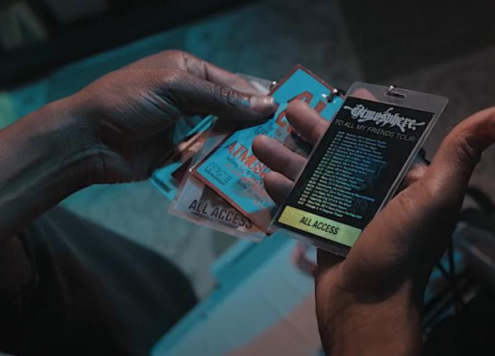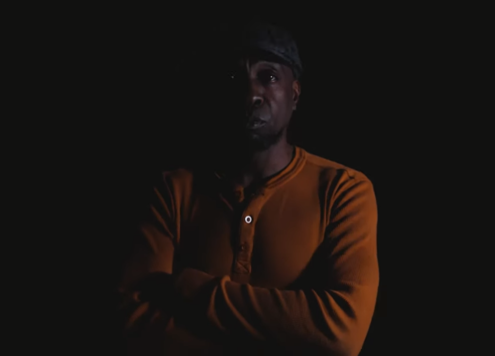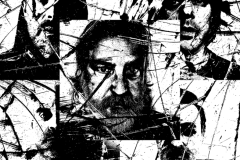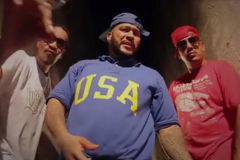The world’s most renowned architects are likely to have a few things in common; the ability to recognize that small and subtle details can result in game-changing flourishes, and that every detail lends itself to a larger picture. Each is purposeful, whether it contributes to the strength of the foundation or the beauty of the end result.
Columbus rap artist Albert Shepard carries a fitting moniker, Blueprint, and his latest effort, the self-released Respect The Architect demonstrates only one aspect of his evolution. Ghettoblaster recently spoke with him about the new record and some other huge, game-changing details.
I first heard about you six years ago when you collaborated with the dudes in Brainbow. Can we ever expect another Brainprint collaboration or something like it?
Thanks man. That Brainbow collaboration was one of my favorites as well. Unfortunately I don’t think the band Brainbow is together anymore, but I’d always be down for something like that in the future. I was and still am a huge fan of that band so getting to collaborate with them was a really special moment. I learned a lot from them during that process.
You continued to work with Brainbow bassist Bobby Silver in some capacity too, correct?
Correct. Bobby Silver is still my guy and still plays bass for me when I do tours where there’s space enough to bring him out.
How connected do you believe that different art and music countercultures are? Is there an interconnectedness between artists working in different mediums and artists like you who are operating primarily in an independent hip hop world?
I think all art scenes are very connected. Many of them may not know it, but when I look at Columbus I see a lot of interconnectedness. Many of the visual artists are also into music, many of the musicians have an expression for visual art, a lot of the guys in bands also grew up on hip-hop, and the hip-hop guys all have an appreciation for rock because of the sampling aspect of hip-hop. So I think they are very connected.
You are currently out on tour in support of Respect the Architect. Is your approach to putting together the live show an equally weighted pursuit to writing and recording?
Yes, it’s very similar. The challenge with any album is making sure it doesn’t come off as a collection of random songs and has a momentum and cohesiveness to it. The same challenge exists, at least to me, when I’m putting together a live show. I want my live show to have a momentum that takes the fan through a lot of different moods and emotions by the time it’s finished.
At the same time, it has to be different than the albums I put together so that it’s still interesting to them. A lot of artists and their fans are ok with just hearing the songs as they appear on record, but I’ve always wanted to give them a little more.
What were the prevailing themes you were trying to communicate on the record?
One of the main themes I tried to get across on the album was perseverance and focus. I have had many challenges on my path and I wanted to be open about those challenges, and hopefully inspire other people with my honesty.
On the title track you mention that you had a struggle with alcohol some years back and have since made the choice to be sober (which I read about on your blog too). Do you care to talk about how that experience has sharpened your focus?
Being sober has completely changed my focus and productivity, but in a way that might be different than what people think. What it did was give me completely different appreciation of time and how valuable it is. Drinking does this thing to you where you always feel like time is flying by. The more you drink, the less you remember about specific times and situations, which can be good if you have a lot of anxiety and stress. But the downside is that it makes you less appreciative of time. You end up spending five or six hours just sitting in one place drinking or doing things that don’t contribute to where you want to be in life. That time flies as well. Next thing you know you’ve got nothing to show for all that time and energy you put into drinking and years have passed.
So being sober now allows me to really appreciate time for the first time in my life. And because I appreciate it more, I try my hardest to take advantage of it every day. I know it is limited so I try to do the most with it every day.
And that came out on Weightless, which is your own label correct? How was putting this record out yourself part of a larger or more deliberate career plan?
Yes, it came out on Weightless, which is my own label. As I get further into my career, I start to understand the importance of ownership. I have put out a lot of records for other labels, but this is the first true solo album I have released myself and owned all the rights to. I think every artist should make an effort to own at least a few thing in their catalog, if they can. I don’t know the future of my next set of projects, but doing it this way has really energized me again because I’m more connected to every step in the process.
How do you balance the management of your career with making time for the art?
That’s very difficult sometimes. Right now, because this album has been a bit more successful than I thought it would be, there are a lot of things I’m getting swamped with that I underestimated. I’m in the process of bringing in people to help me out, but it’s a process and I don’t expect that to fully be in place until my next Weightless release.
The good thing is that outside of touring, I don’t really ever feel swamped. Touring only allows me an hour or two each day to handle business, which is not much at all. The rest of the time is spent handling the business of the tour. Having more business than usual is a good problem to have to I’m not really complaining about it at all. Things could certainly be a lot different.
Are there liberties, freedom or other positive catalysts that calling Ohio homebase has afforded you during your career?
The main benefit I’ve experienced from being in Columbus has been living in a city that actually supports the arts and local artists. I lived in Cincinnati from 1997-2004 and that was a huge struggle, not just for me, but for everybody around me. It was really difficult to gain momentum and support in Cincinnati, but when I moved back to Columbus all the things I was doing started to get better reception and support.
Columbus isn’t perfect, but I can’t complain about it at all. It’s small enough to not feel overwhelmed, but big enough to where you can gain a following there.
You’ve been very active in social media, embracing blogging as a form of communication. Has that been a game changer for you in terms of building dynamic, symbiotic relationships with your fanbase?
For sure. Blogging has completely changed the way I interact with my fans. I had no idea how it would work when I started it, but I was watching a lot of the other blogs and studying them for a bit, so I knew there was potential. But now I completely see it. At least two or three times a night on this tour, fans come up to me and reference one of my blogs, and tell me it inspired them. They appreciate the fact that I write about things no other artist is writing about. It’s added another dimension to my career and ability to interact with my fans.
You’ve also written a couple of books. Is that a natural extension of the writing you do lyrically?
I actually view the books as an extension of the blogging. I never really had the confidence to write the books until I started blogging. Over the course of a few years, where I was able to build up my confidence by writing 1,000 to 1,500 words at a time, I slowly gained confidence. And with that confidence came the decision to try my hand at writing books.
I’ve read some pretty great books by rap artists, including Chuck D’s, and some terrible ones (Busy Bone). Do you measure your writing against other rap artists?
Of course I’m a bit biased, but I’d rate my writing up there with the best of them, but not from a technical sense. I think my writing ranks high in terms of honesty and usefulness. I want to be honest and write things that people can get something out of. I read a lot so I’m not just writing the books to make money or out of obligation, but more as a natural extension of my love of literature. I just want to contribute and inspire others. As long as I can do that then I’m happy with where I’m at. I’ve got many more books left in me.
Being that I’m in Dayton, I have to ask you about working with Terry Troutman?
Getting to work with Terry Troutman was an awesome experience. Just being able to drive to Dayton, walk into his studio space, and see all the platinum plaques hanging on the walls was enough. But getting to see him fire up the Yamaha DX-7 and do all that talkbox stuff live was something else. He was a true professional and I will never forget that experience. He kept asking me if I was happy with what he was doing and all I could do was smile and say “hell yeah!”
(Visit Blueprint here: https://www.facebook.com/printmatic.)












Social Media